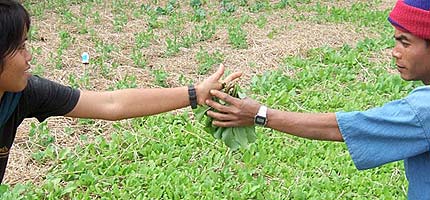© Simon Mackenzie
Thailand - Australia: Partnership Spanning Oceans
In a field near the village of Ban Napong, in far northeast Thailand, Brang and Min are harvesting their first crop of green vegetables. They’re excited. These young people are doing something that has never been done here before. Their parents or grandparents never grew vegetable crops on a large scale. There was never enough money to buy that much seed.
So Brang, Min and their fellow villagers are literally breaking new ground. They are players in a new project and partnership that is bringing hope for sustainable food production and livelihoods to the people of Ban Napong and neighboring villages.
The Lua’ people of the remote Nan Province belong to a minority cultural group originating across the border in Laos. During and following the Vietnam War, many Lua’ families sought refuge in Thailand and settled in the mountainous areas of the Nan Province, where they have maintained languages, traditions and practices quite distinct from those of ethnic Thais.
Traditionally mountain dwellers, they form part of the multicultural, multilingual group known in Thailand and neighboring countries as “hill tribes”. Widely promoted as a tourist attraction, some hill tribes have discovered that the surest way to ensure their economic survival is to open their villages to camera-toting tourists.
Government programs are assisting some hill tribes to develop sustainable and ethical ways of making a living, predominantly by growing cash crops. In the Nan Province the Lua’ people are able to use government land on which to grow crops, but they have no experience growing vegetables or with agricultural practices such as crop rotation. They need to learn, however, and quickly, or they risk starvation. Over the past few years, crop failure rates in their mountain rice fields have been very high. The inability of hill tribe parents to feed their families is a primary reason so many children end up as sex workers in Bangkok and beyond. The Lua’ people wanted to help themselves and protect their children’s future, but they needed a helping hand.
Some 8,000 kilometers southeast of the Nan Province is the stylish resort town and international tourist mecca, Noosa, home to some of Australia’s most pristine beaches. The LutheranChurch of Australia (LCA) congregation at Noosa supports the local people by providing the funds necessary to purchase vegetable seed. This year, the villagers in four of the neediest communities were able to plant various types of garlic and brassica (mustard) and leafy vegetables such as bok choy and spinach.
Rev. Dr Ulf Metzner, a member at the Noosa congregation and former LCA director of World Mission, said that, although the congregation was already active in local missions, it wanted to be involved with a community overseas. “The personal connection with a community is important in order to build the partnership and relationship over the years,” he said.
Over the last decade or so, partnerships between the LCA and southeast Asian churches, including the Evangelical Lutheran Church in Thailand, have been strengthening and, in some cases, direct links have been made between Australian congregations and schools and southeast Asian congregations, schools or projects.
Glenice Hartwich, LCA Board for Mission project officer, believes these partnerships are mutually beneficial. One party is not the giver and the other the receiver; both are givers and both are receivers. “As followers of Jesus Christ we are connected … In the body of Christ, we cannot live in isolation from each other.”

